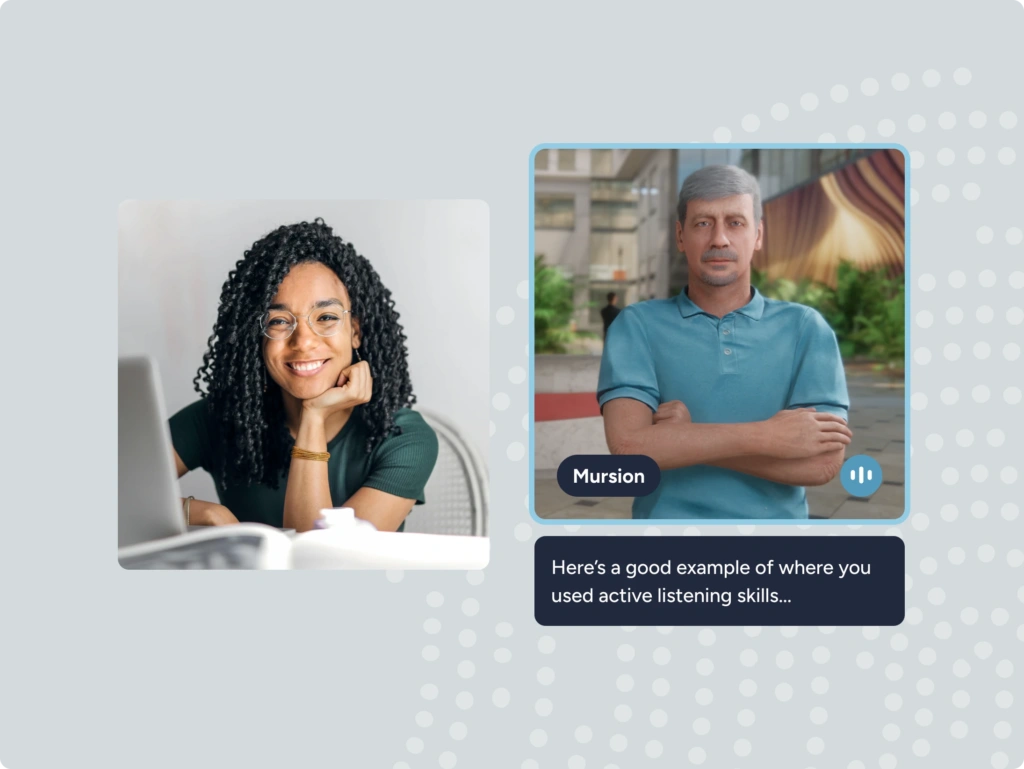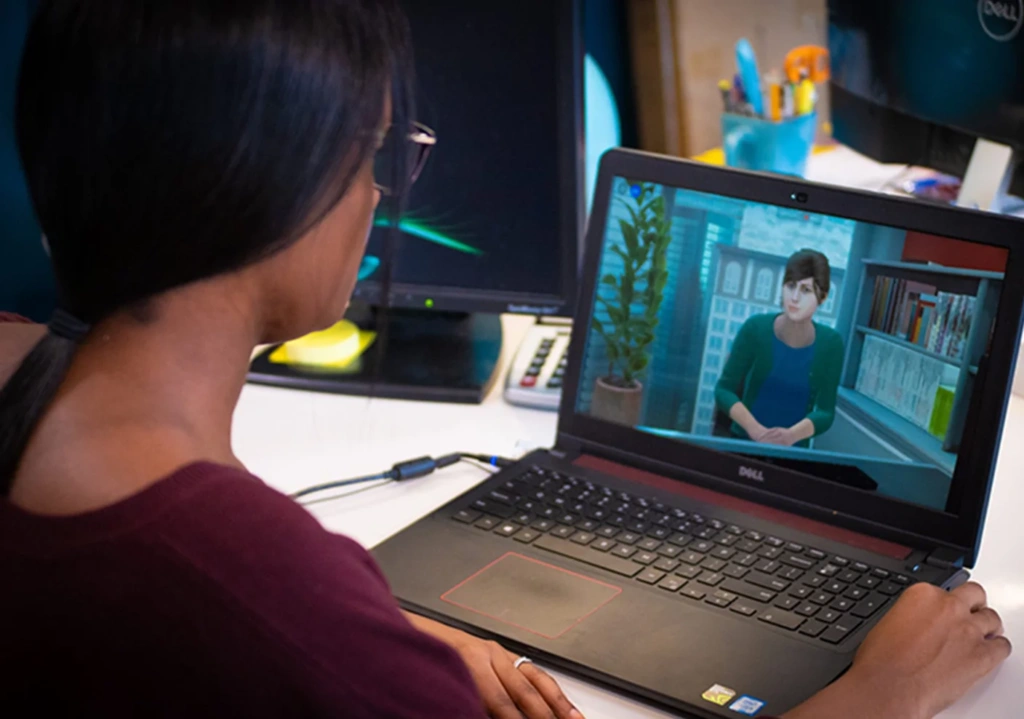The Mursion team hosted a special open house-style Future of Work Roundtable session with our own Monika Jo, who presented findings from our latest e-book, “The Human Edge in an AI World.” This survey of more than 600 learning leaders and sales and customer service professionals revealed insights into how to build more profitable and long-lasting customer relationships. What follows is an excerpt from Monika’s presentation.
“Talking about VR and curiosity studies about VR, this is Jeremy Bailenson. We draw a lot on his hero study that he conducted. To summarize or to encapsulate, he wanted to ask the question of, does what happens in VR stay in VR? In particular, that if you are given superpowers in a simulated environment, what does that mean for your behavior outside of that immersive world?
The study concluded and demonstrated that when you give people superpowers in VR and allow them to perform heroic things and heroic actions in an immersive world, in the real world, that it actually translates into altruistic behavior. I thought that was really fascinating and I endeavored to seek out answers to that same question. As a cultural anthropologist, really I wanted to focus on what are some of the uses of VR that’s really compelling and engaging in addition to gaming? Nothing wrong with gaming, but VR can have lots of other purposes other than entertainment.
What sets us apart as, people, as humans, is our communication skills, our language. Human language is at the heart of creating culture, transforming people and so that at the heart of being human is how we communicate. It really permeates all throughout our culture can be quite a transformative tool and creative tool itself. Communication is a creative endeavor for humans.
What sets us apart as, people, as humans, is our communication skills, our language.
I’m really thrilled to be part of the Mursion team where this advanced technology is a tool for really fine-tuning this other tool that we have, which is our skill and our conversational skills, our communication skills. So much about what being human is about how we connect with each other through language and through communication in general. You see it, you hear it like when someone says, we speak the same language, it signals understanding of each other, not just the literal, I understand and that literally speaking the same language.
I’ve had the privilege of not only working with advanced technology and immersive technology, but also in my work where that natural language processing experts in linguistics. You hear it also in sacred texts when you hear in the beginning was the word, and also when people say the word is your bond. It means so much for us to be able to communicate with one another, and so simulating conversation and that aspirational pull that we have to make that human connection and to use the right words to connect with each other is so crucial.
The Study of Human Nature
The first study that Mursion conducted is titled ‘VR Changes the Game for Soft Skills Training,’ and it was to really help to discover and explore the best way to develop soft skills. I’m excited to say as a VR curious storyteller, that it is gaining steam, and we see that across different industries. In education, I work a lot with our education team here. We’re finding the same thing. It’s a bit of a somewhat self-referential or a meta-application, in that, we’re teaching the teachers, or training the trainers.
On the education side, I can report that this is absolutely true, that there’s a lot of high utility for pre-service teachers. Folks who’ve never stepped into a classroom performing that role, that they can practice all of these difficult conversations, for instance, parent-teacher conversations. That’s a really tough one as a use case and almost impossible to practice in whether it’s role-play or you can’t really practice on actual parents and angry parents. I think that there’s a ton of opportunity for VR to help train for those really difficult conversations.
The next e-book that we did, ‘OOO: Out of Mind,’ was released around the anniversary of unofficially the national lockdown. We sought to understand better how this distributed workforce, I think hybrid is a hybrid workforce, hybrid education, hybrid everything is in our future, whether it’s, well, we’re experiencing it right now, in fact.
I think it has definitely some legs and permanence and because of this, the shift to remote work has consequences in how we communicate with each other. Especially when we uncovered and fleshed out this particular statistic that not everyone has a desire, a strong desire to go back to the office. Isn’t certainly not within this timeframe that we had outlined or the way we frame the question in the survey.
Given that, what are people doing about communication and taking accounting for an accommodating for the fact that people don’t want to go back to the office and at best, maybe go back to the office one or two days a week? It’s startling to think about the majority of companies, do have a plan I’m happy to say, but still more than one-third of them, that are large enough, 2,500 employees or greater, don’t have a long-term strategy. I think that can have some really meaningful, potentially adverse impacts packed on workers.
Current Sales and Customer Service Trends
This is our headliner research, our latest one, and this was designed to reveal the biggest challenges that sales and customer service professionals face today. Personally, I have not formally performed this role of customer service. I can say that it is a very challenging based on the fact as a customer myself. I know we put our customer service reps through the paces, and so many companies actually, when you enter the company and enter their organization, it is so challenging, but it is also such a great opportunity to understand your customer better, that a lot of companies start people in customer service roles, customer support roles, and even some CEOs and C-suite will engage with customers in that particular role, because it means so much to your brand.
We broke this research down to two parts, looking at the customer service side and then the sales side. For the customer service portion of the e-book, this was one of the things that we learned, is that 71% of the people who’ve responded say that emotional intelligence is becoming more important than cognitive intelligence for customer service jobs. I think intuitively we all know how important emotional intelligence is, but essentially this signals that the debate is over.
71% of the people who’ve responded say that emotional intelligence is becoming more important than cognitive intelligence for customer service jobs.
It is really, really crucial and not to discount cognitive intelligence, because you do need a mix. Your workforce needs to be able to be adaptable and have the cognitive intelligence powered to learn new things and be flexible. Also, in that mix, emotional intelligence is very important. We also didn’t want to just say, ‘No duh, emotional intelligence is important.’ We wanted to dig down more deeply below the surface and break down some of the insights and share what we learned by industry.
On the sales side, something really interesting popped up, and our observation is that industries who were more impacted and earlier on the adoption curve for automation and AI, have prioritized training for the human touch, or at least recognize the importance of it.
This is how prominent that was in the survey. In aggregate, in total, it was about 68% of the respondents in the sales capacity who said that they focus on the human touch and you can see that technology, financial services, and manufacturing who have been affected earlier on in the piece, affected by automation and AI, they place more importance on human touch and more focus more than the totality of the aggregate number of 68% as I shared.
This was the big takeaway, as more for sales, that’s more steps in the sales cycle are automated, it will be absolutely crucial that teams make every moment of human interaction shine. In the study, also, we share a couple of customer stories about, what their direct experience in these different arenas of customer service and in sales. The sales customer story is really, really fascinating.
When people are able to imagine and visualize what the other person might be doing, you’re on your way to really hitting on that emotional intelligence.”



